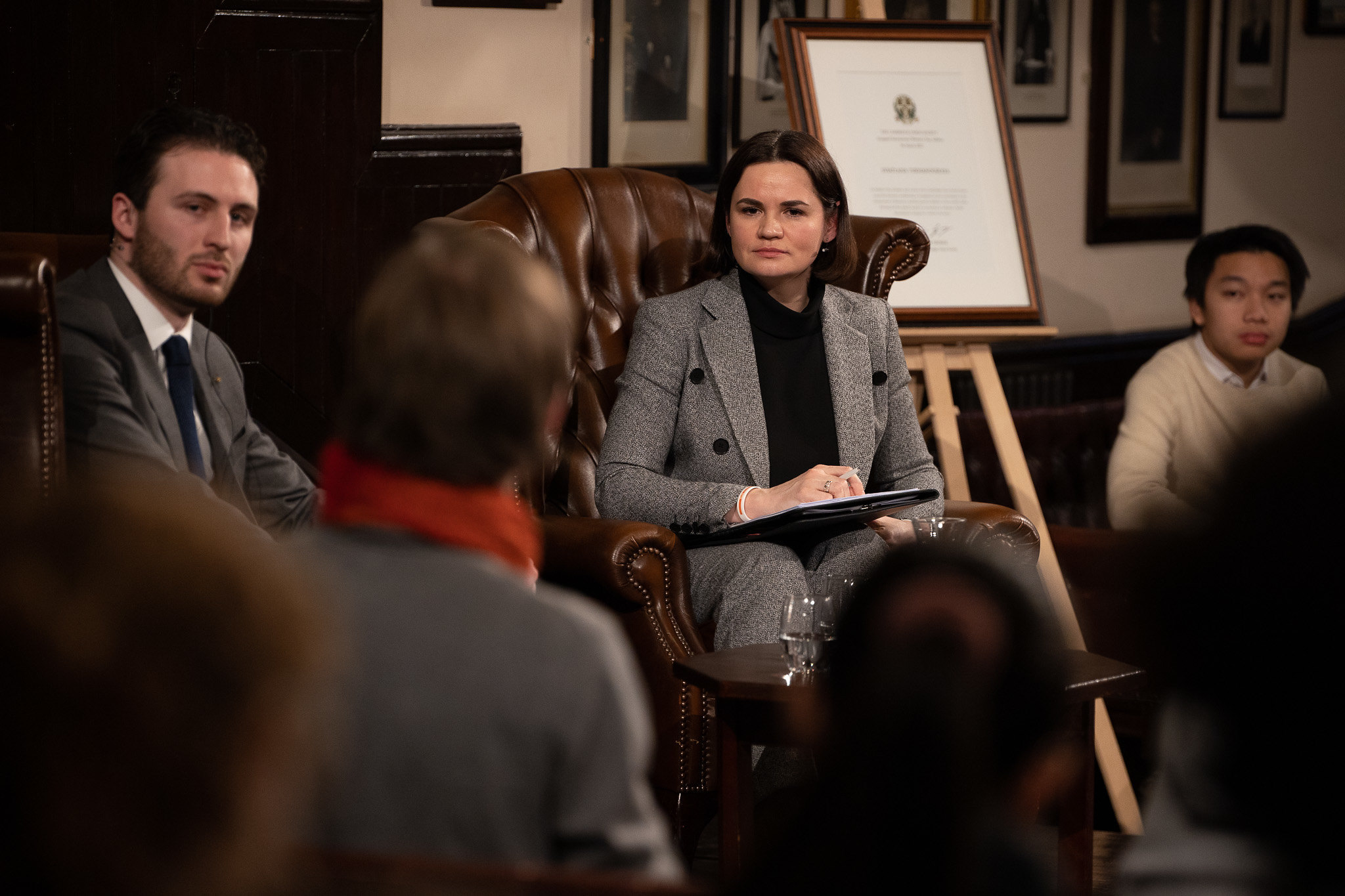Sviatlana Tsikhanouskaya says fights in homeland, Belarus, and Ukraine are linked by desire for democracy and independence from Russia
Sviatlana Tsikhanouskaya’s political career began when her husband, Siarhei Tsikhanouski, was jailed after announcing plans to challenge Belarus President Aliaksandr Lukashenko in 2020. The political newcomer ran in her husband’s place, and after Lukashenko was declared the winner in a contest widely viewed as fraudulent, mass protests broke out in Belarus for months.
Tsikhanouskaya, fearing for her safety, fled to Lithuania, where she leads the Belarusian opposition, which includes partisans who are working against the Russians in their attempt to take over Ukraine. Tsikhanouskaya’s group views their support of Ukraine as part of a larger pro-democracy battle pitting that nation and their own against Lukashenko and his ally, Russian leader Vladimir Putin, who seeks to reassert Moscow’s control in the region.
Tsikhanouskaya will be a keynote speaker at the John F. Kennedy Jr. Forum at the Institute of Politics on Friday and share the stage with European Parliament President Roberta Metsola. This event is part of the student-led European Conference at Harvard on Friday and Saturday and co-sponsored by the Minda de Gunzburg Center for European Studies, the Weatherhead Center for International Affairs, and the Davis Center for Russian and Eurasian Studies.
This interview was edited for length and clarity.
GAZETTE: What are some of the key issues and policy debates in Europe you’re planning to speak about during your address at the Institute of Politics? How does Belarus play a role in Europe’s security?
 TSIKHANOUSKAYA: The people of Belarus and the Ukrainians are facing the same enemy. Russia wants to return our countries to the sphere of Russian influence. We have always felt ourselves to be European, and we don’t want to be connected with Russia. Russia now is synonymous with war and poverty, and Europe is democracy and peace, and we want the same for our country. We want to break the perception that Belarus is part of Russia or a post-Soviet Union country. While Lukashenko is in power with the help of violence and criminal support, he will always obey Putin and fulfill his orders, and there will be a constant threat to the security of the region.
TSIKHANOUSKAYA: The people of Belarus and the Ukrainians are facing the same enemy. Russia wants to return our countries to the sphere of Russian influence. We have always felt ourselves to be European, and we don’t want to be connected with Russia. Russia now is synonymous with war and poverty, and Europe is democracy and peace, and we want the same for our country. We want to break the perception that Belarus is part of Russia or a post-Soviet Union country. While Lukashenko is in power with the help of violence and criminal support, he will always obey Putin and fulfill his orders, and there will be a constant threat to the security of the region.
GAZETTE: What measures can the European Union take to support the pro-democratic movement in Belarus?
TSIKHANOUSKAYA: Consistency is powerful. If the European Union doesn’t recognize Lukashenko as president, it should not meet with representatives of the [Belarusian] regime. If it knows that Lukashenko is guilty of crimes against humanity and war crimes, then it should hold him accountable and start an investigation. The European Union can apply pressure on the regime through sanctions and political isolation. It can also support civil society. A huge number of people fighting the regime had to flee the country, and they need financial support. So do the families of political prisoners. We fully support the Ukrainians, but the war will not be over until Belarus is free too.
GAZETTE: What is your perspective on the United States’ foreign policy toward Russia, Ukraine, and Belarus?
TSIKHANOUSKAYA: [The United States] should unite in implementing measures against Lukashenko together with the European Union. Joint positions will be more effective. It should also support the Belarusian people and punish the regime. The U.S. needs to understand that Belarus and Ukraine are intertwined. Lukashenko is a full collaborator with Russia in the war in Ukraine.
I would also ask the American government to pay attention to the criminal occupation of Belarus because now we are seeing the presence of Russian troops in Belarus. We see how Russia is step by step occupying our cultural, economic, and military spheres, and we want to hear a clear message that any attempts to occupy Belarus will not be tolerated. There should be a wide range of personal sanctions placed on those serving the [Lukashenko] regime: work with democratic forces, NGOs, support cultural institutions, assist political prisoners, and offer scholarships to students.